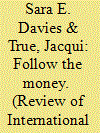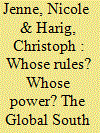| Srl | Item |
| 1 |
ID:
187032


|
|
|
|
|
| Summary/Abstract |
The Women, Peace and Security (WPS) agenda and women's participation in peace processes are strongly supported by states. Yet financing to support the implementation of WPS has lagged behind overt international commitments to the agenda. WPS scholars and practitioners have highlighted the funding shortfalls for enabling WPS implementation and continued under-investment in gender-inclusive peace. In this article, we ask how much are donor states financially backing the implementation of gender-inclusive peace agreements which they promote? We use a high ambiguity-conflict model of policy implementation to explore the mechanisms of bilateral and multilateral financing for gender-inclusive peace. We trace to what extent international investments are supporting specific gender provisions in two progressive gender-inclusive peace processes, the 2016 Colombian Peace Agreement and 2015 Comprehensive Peace Agreement in the Philippines. In both case studies, we reveal a drastic gap between the international donor rhetoric and the funding. Patterns of financial investment do not follow nor support the life cycle of inclusive peace processes. We suggest key strategies for further research to address this policy and recommend that all gender provisions of peace agreements be monitored in-country and all gender-responsive investments be tracked and evaluated.
|
|
|
|
|
|
|
|
|
|
|
|
|
|
|
|
| 2 |
ID:
193849


|
|
|
|
|
| Summary/Abstract |
While the normative development of the UN’s focus on protection of civilians is well covered, there is little research on how more than two decades of translating the norm into practice has led to the development of an entire ecosystem of early warning tools across the UN system. Most of these tools have been created at the field level, and UN Member States have neither played a role in pushing for these tools nor in helping to develop them. This article makes two contributions. Empirically, the article maps the ecosystem of early warning tools for protection of civilians in UN peace operations. Second, drawing on practice theory, the article reflects on the origin of these tools and argues that bottom-up norm implementation practices in international organizations amount to norm fixations—collectively describing what a norm is and how it should be implemented in practice.
|
|
|
|
|
|
|
|
|
|
|
|
|
|
|
|
| 3 |
ID:
187031


|
|
|
|
|
| Summary/Abstract |
International organisations reflect global power configurations and as such, are deemed to reproduce global inequalities. Nevertheless, they also represent opportunities for the Global South to challenge the global stratification of power, for instance by providing personnel to international agencies and bureaucracies. This article examines the role of leadership personnel from the Global South in implementing robust peacekeeping mandates.
Given that states from the Global South have often been hesitant to support the use of force internationally, can leadership positions in peace operations help these states to influence norms at the implementation level? We develop a conceptual understanding of individuals’ role in implementing norms and apply the framework to military force commanders from Brazil, India, and Rwanda. The analysis demonstrates that appointments provide an opportunity for norm contestation, but do not necessarily guarantee such influence. Under certain circumstances, we find that military force commanders can actually undermine their governments’ preferences. However, the relation between force commanders’ practices and their country of origin's policy stance is complex and influenced by a variety of different factors that merit further investigation.
|
|
|
|
|
|
|
|
|
|
|
|
|
|
|
|